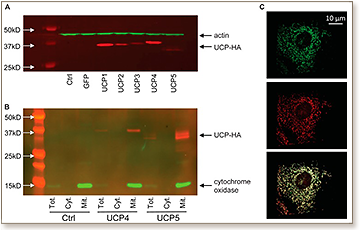 Brain activity is energetically costly and requires a steady and highly regulated flow of energy equivalents between neural cells. It is believed that a substantial share of cerebral glucose, the major source of energy of the brain, will preferentially be metabolized in astrocytes via aerobic glycolysis. The aim of this study was to evaluate whether uncoupling proteins (UCPs), located in the inner membrane of mitochondria, play a role in setting up the metabolic response pattern of astrocytes. UCPs are believed to mediate the transmembrane transfer of protons, resulting in the uncoupling of oxidative phosphorylation from ATP production. UCPs are therefore potentially important regulators of energy fluxes. The main UCP isoforms expressed in the brain are UCP2, UCP4, and UCP5. We examined in particular the role of UCP4 in neuron-astrocyte metabolic coupling and measured a range of functional metabolic parameters including mitochondrial electrical potential and pH, reactive oxygen species production, NAD/NADH ratio, ATP/ADP ratio, CO2 and lactate production, and oxygen consumption rate. In brief, we found that UCP4 regulates the intramitochondrial pH of astrocytes, which acidifies as a consequence of glutamate uptake, with the main consequence of reducing efficiency of mitochondrial ATP production. The diminished ATP production is effectively compensated by enhancement of glycolysis. This nonoxidative production of energy is not associated with deleterious H2O2 production. We show that astrocytes expressing more UCP4 produced more lactate, which is used as an energy source by neurons, and had the ability to enhance neuronal survival.
Brain activity is energetically costly and requires a steady and highly regulated flow of energy equivalents between neural cells. It is believed that a substantial share of cerebral glucose, the major source of energy of the brain, will preferentially be metabolized in astrocytes via aerobic glycolysis. The aim of this study was to evaluate whether uncoupling proteins (UCPs), located in the inner membrane of mitochondria, play a role in setting up the metabolic response pattern of astrocytes. UCPs are believed to mediate the transmembrane transfer of protons, resulting in the uncoupling of oxidative phosphorylation from ATP production. UCPs are therefore potentially important regulators of energy fluxes. The main UCP isoforms expressed in the brain are UCP2, UCP4, and UCP5. We examined in particular the role of UCP4 in neuron-astrocyte metabolic coupling and measured a range of functional metabolic parameters including mitochondrial electrical potential and pH, reactive oxygen species production, NAD/NADH ratio, ATP/ADP ratio, CO2 and lactate production, and oxygen consumption rate. In brief, we found that UCP4 regulates the intramitochondrial pH of astrocytes, which acidifies as a consequence of glutamate uptake, with the main consequence of reducing efficiency of mitochondrial ATP production. The diminished ATP production is effectively compensated by enhancement of glycolysis. This nonoxidative production of energy is not associated with deleterious H2O2 production. We show that astrocytes expressing more UCP4 produced more lactate, which is used as an energy source by neurons, and had the ability to enhance neuronal survival.